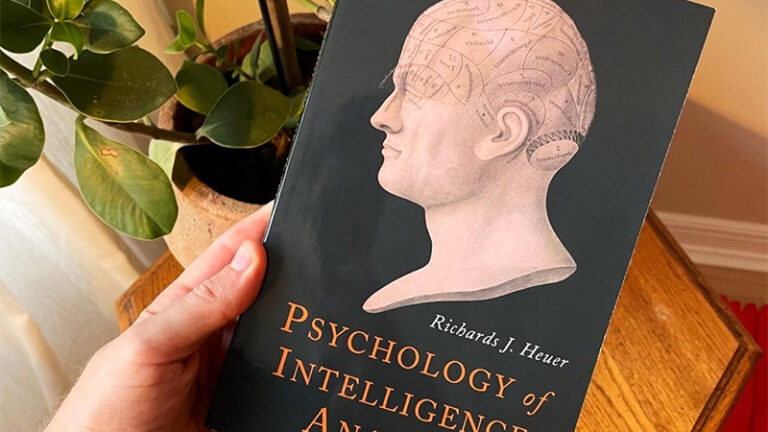Psychology of Intelligence Analysis by Richard J. Heuer is a classic book that explores the psychological factors affecting the quality of intelligence analysis, including bias, group dynamics, and cognitive limitations. It provides insights on the importance of structured analytical techniques, diverse perspectives, and the role uncertainty in intelligence analysis.
Analytic thinking is a practice skill
“Thinking analytically is a skill like carpentry or driving a car”. It can be learned! It can be improved with practice.It’s not learned by sitting in a class room and being told how to do it. It’s about learning by doing.
Suspend your judgement
Suspend making a judgement for as long as possible. Because you want to have as much information as possible when you do. This is because once judgments are made, it sticks. Convictions are hard to change once they already exist.
Video Review of Psychology of Intelligence Analysis
More information is not always better.
More information does’t not automatically increase analysis accuracy. That said, you should not overvalue the importance of more information. More information gives more confidence, but not always more accuracy. Studies show that increases information results in a strong rise in confidence, but a negligible increase in accuracy.” Testing more hypothesis is often better than just gathering more information.
Techniques for creative thinking
Most important one technique for creative thinking is called: Deferred Judgement. This concept dictates that The idea generation phase should be separated from the evaluation phase. Get all ideas on the table before evaluating them and make judgements. This is because quantity leads to quality, thinking should range freely, and it encourages cross pollination of ideas.
Mental Schema
“If information does not fit into what people know, or think they know, the have great difficulty processing it.”
Mental Schema: mental structures that an individual uses to organize knowledge and guide cognitive processes and behaviour. People use schemata (the plural of schema) to categorize objects and events based on common elements and characteristics and thus interpret and predict the world.
Example of the impact of mental schemata:
The chess masters and ordinary chess players were given 5-10 seconds to note the position of 20 – 25 chess pieces placed randomly on a chess board. Both masters and ordinary players were alike in their ability to remember the positions of the pieces (~6-7 pieces). But if the pieces where taken from an actual game (this was unknown to the subjects) the chess masters were able to remember almost all positions without errors, while ordinary players only remember half a dozen pieces.
The exceptional performance was because they where immediately able to recognize important patterns of what contains relevant information for them. — this is a mental schema.
Takeaway: How to break creative blockages
1. Take a break:
The passage of time makes it easier to see new connections.
2. Force yourself to talk about loud.
Say it out loud, ask yourself questions and answer them. Scientists explains that written and spoken language is processed in different parts of the brain. Switching between the two modes are likely to untangle your problem.
⚖️ Book Verdict – Psychology of Intelligence Analysis
Reading books like this will improve your thinking. Mostly because they erode your false confidence a bit as we hear about the biases and shortcomings of judgment that plague human beings. It’s very humbling. This books is specifically aimed at Intelligence. That is, people who They analyze information and allow us to understand, mitigate, and neutralize threats.
Hence, it’s not for everyone, and that also why I struggled with this book quite a lot. It’s pretty dry and technical at times.
⭐️ ⭐️ ⭐️ out of 5
Find more great book to read on my book reviews page and the Great Books List
Video Reviews every week on YouTube and support the BookLab mission on Patreon
The book explores the psychological factors that affect the quality of intelligence analysis, including bias, group dynamics, and cognitive limitations. It also provides insights on the importance of structured analytical techniques, diverse perspectives, and the role uncertainty plays in intelligence analysis.
Yes, analytic thinking is a skill that can be learned and improved with practice. It is not learned by sitting in a classroom and being told how to do it; it is about learning by doing.
It is best to suspend making a judgment for as long as possible because you want to have as much information as possible when you do. Once a judgment is made, it tend to stick, and convictions are hard to change once they already exist.
The book is specifically aimed at people who analyze information to understand, mitigate, and neutralize threats. It may not be for everyone, as it can be dry and technical at times. However, reading books like this can improve your thinking by eroding false confidence and expose biases and shortcomings of judgment that tend to plague human beings.





